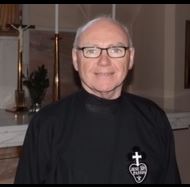On a few occasions in this Log I have mentioned the five years I spent, from 1970-1975, working in the Accounts Department at the Olivetti factory in Queenslie, before leaving to enter the Passionists. I was blessed with good work companions and good bosses and, for the most part, I enjoyed my work, even though that particular period involved a time of high inflation, leading to miners’ strikes, resulting in the imposition of a three-day working week to conserve electricity, and the enforced redundancies of friends and colleagues, the sorrow of which I feel to this day.
A few weeks ago, I unexpectedly received a phone call from one of my old Olivetti bosses. He had come across a selection of my Logs in the Flourish and decided he would make contact with St. Mungo’s and try to meet up with me, which I was very happy to do as I remembered him as a very kind, helpful, humorous and humble man. After one or two failed attempts we eventually met for lunch this week. Not having seen each other for more than forty years, I actually walked past him twice without recognising him, before tentatively approaching him. He had been looking at me with uncertainty as well, eventually telling me that my photograph in the Flourish suggested I had more hair than I actually had, so, not the most auspicious of starts to our reunion.
Naturally, we reminisced about those turbulent times and circumstances, and about the people we remembered, he coming up with names I had forgotten about, and me coming up with names that he had forgotten about, as is natural. We filled each other in on how our own lives’ journeys had developed and in the course of that he recounted for me a serious health scare he endured some years ago, a heart episode during which his heart actually stopped twice and, to cut a long story short, he could not have been more effusive in his praise of the paramedics, the ambulance crew and the NHS, to the point that he later wrote to a couple of newspapers and to the NHS, at a time when the NHS was under fire, to express his deep gratitude. The only ones that responded were the NHS. One of the things that helped him was that he had kept himself fit over the years and that stood him in good stead for the surgery.
However, even more so, my old boss attributed his recovery to the power of prayer. He was always a man of faith and a man of prayer, involved in parish life, offering his time and his talents, but he and his wife had also become part of an international network of prayer, and so he knew that prayers were being said for his recovery in different parts of the world and, for him, this was the key to his recovery. In fact, when we met that day, he handed me a card from him and his good wife to give to my younger brother, whom they have never met, but whose health struggles they had also read about in my Logs, to assure him that he was now being prayed for by them, and by this network, this community of intercessory prayer. I was deeply moved by this and very grateful, and I gave the card to my brother that same day.
Here is St. Mungo’s, while we are celebrating Mass in the hall during major refurbishment in the church, and so unable to burn votive candles for health and safety reasons, we have a prayer tree, whereby people write their intention on a leaf and hang it on the tree. When remembering these intentions, I always say that the prayer of each one of us becomes the prayer of all of us, because we are a community, a family of faith. The prayer of intercession is such an important part of our lives of faith, but how much more powerful it is when it is not just the prayer of one, but of many people, mindful of each other before our loving God.
We never know how God will answer our prayers, but we can expect that He will get us involved in His plan for the answer. If we are true intercessors, we must be ready to take part in God’s work on behalf of the people for whom we pray. (Corrie Ten Boom)

 RSS Feed
RSS Feed
